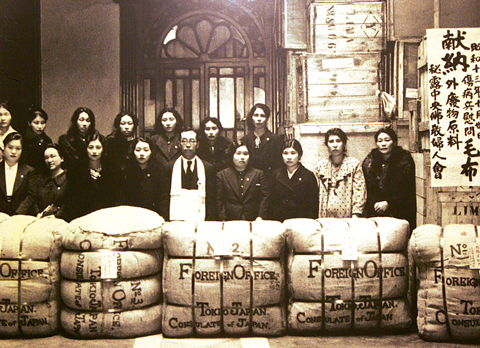Augusto Kague was only 12 when the US government reached far south to his Peruvian farming town and tore his family apart.
It was January 1942 — a month after Japan attacked the US naval base at Pearl Harbor, killing 2,400 and drawing the US into World War II. The roundup of 110,000 Japanese-Americans had begun.
But internment efforts went far beyond US borders — a little-known fact to this day.

PHOTO: AP
Kague’s father, a Japanese immigrant in Peru, was whisked away by security agents, one of 2,264 men, women and children of Japanese ancestry arrested in Latin America and shipped off to US camps. They were interned under the guise of securing Western Hemisphere interests, including the Panama Canal. About 800 were used in prisoner swaps with Japan, turned over to a country that some — as Latin American-born descendants of Japanese immigrants — had never seen.
Now, 20 years after Japanese-Americans won redress for their imprisonment, a small community of Peruvians continues to seek justice with the help of the American Civil Liberties Union and a grassroots activist effort based in Northern California.
The group thought it had a breakthrough when a US House Judiciary subcommittee set a July 31 hearing on a bill that would mandate an investigation into the internment of Japanese-Latin Americans and propose remedies.
But the hearing was canceled, and a spokesman for Democratic US Representative Xavier Becerra, the bill’s sponsor, said it’s unclear when it would be rescheduled.
The hearing would have been just one step in a decades-long battle. The US government didn’t include Japanese-Latin Americans when agreeing in 1988 to apologize and pay US$20,000 to interned Japanese-Americans.
The government offered US$5,000 and an apology 10 years ago as part of a settlement agreement for a lawsuit filed on behalf of Japanese-Latin Americans.
While some took the settlement, Kague was one of hundreds who refused it as unfair. His youngest brother, who was born in a Texas internment camp, got US$20,000 as a US citizen.
Three more lawsuits were filed and thrown out, according to the Campaign for Justice, a San Francisco Bay Area coalition seeking redress. The campaign in 2003 also filed a redress petition with the human rights arm of the Organization of American States that is still pending.
Brazil, Panama, Bolivia and other Latin American countries deported people of Japanese ancestry and allowed the US to strip them of their citizenship.

A French-Algerian man went on trial in France on Monday for burning to death his wife in 2021, a case that shocked the public and sparked heavy criticism of police for failing to take adequate measures to protect her. Mounir Boutaa, now 48, stalked his Algerian-born wife Chahinez Daoud following their separation, and even bought a van he parked outside her house near Bordeaux in southwestern France, which he used to watch her without being detected. On May 4, 2021, he attacked her in the street, shot her in both legs, poured gasoline on her and set her on fire. A neighbor hearing

DEATH CONSTANTLY LOOMING: Decades of detention took a major toll on Iwao Hakamada’s mental health, his lawyers describing him as ‘living in a world of fantasy’ A Japanese man wrongly convicted of murder who was the world’s longest-serving death row inmate has been awarded US$1.44 million in compensation, an official said yesterday. The payout represents ¥12,500 (US$83) for each day of the more than four decades that Iwao Hakamada spent in detention, most of it on death row when each day could have been his last. It is a record for compensation of this kind, Japanese media said. The former boxer, now 89, was exonerated last year of a 1966 quadruple murder after a tireless campaign by his sister and others. The case sparked scrutiny of the justice system in

DITCH TACTICS: Kenyan officers were on their way to rescue Haitian police stuck in a ditch suspected to have been deliberately dug by Haitian gang members A Kenyan policeman deployed in Haiti has gone missing after violent gangs attacked a group of officers on a rescue mission, a UN-backed multinational security mission said in a statement yesterday. The Kenyan officers on Tuesday were on their way to rescue Haitian police stuck in a ditch “suspected to have been deliberately dug by gangs,” the statement said, adding that “specialized teams have been deployed” to search for the missing officer. Local media outlets in Haiti reported that the officer had been killed and videos of a lifeless man clothed in Kenyan uniform were shared on social media. Gang violence has left

US Vice President J.D. Vance on Friday accused Denmark of not having done enough to protect Greenland, when he visited the strategically placed and resource-rich Danish territory coveted by US President Donald Trump. Vance made his comment during a trip to the Pituffik Space Base in northwestern Greenland, a visit viewed by Copenhagen and Nuuk as a provocation. “Our message to Denmark is very simple: You have not done a good job by the people of Greenland,” Vance told a news conference. “You have under-invested in the people of Greenland, and you have under-invested in the security architecture of this